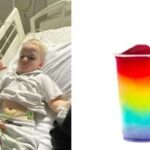Woman, 21, Left Fighting for Life After Drinking Coffee She Bought at Airport
The post Woman, 21, Left Fighting for Life After Drinking Coffee She Bought at Airport appeared first on Healthy Holistic Living.
A routine coffee purchase at Majorca airport turned into a life-threatening ordeal for a young woman, revealing a startling oversight in public safety protocols. This incident not only raises serious questions about the hygiene standards at major transportation hubs but also serves as a chilling reminder of the unexpected dangers lurking in everyday conveniences. As we uncover the details of this unsettling event, the story will not only shock you but also prompt a critical examination of what is often taken for granted.
The Coffee Routine Incident
On a bustling Monday at Son Sant Joan airport, near the vibrant capital city of Palma, Majorca, a routine act of buying a coffee from a vending machine turned into a horrifying ordeal for a 21-year-old airline employee. This young woman, whose day began like any other, found herself caught in a distressing scenario that would not only endanger her life but also expose serious health and safety failures.
As she took a sip of her coffee during a brief break, she immediately noticed an unusual, bitter taste. Trusting her instincts, she examined the contents of the cup more closely, only to find a swarm of insects crawling among the coffee grounds. The sight of live insects in a beverage that came from a machine frequented by thousands highlighted gross negligence. This alarming discovery points to a lapse in regular maintenance and sanitation protocols, which are critical in high-traffic public areas like airports.
The presence of insects in her coffee caused immediate alarm, not only to her but also potentially to other travelers and staff at the airport. The incident raised significant concerns about the overall hygiene practices at the facility. Vending machines, often overlooked during routine cleanings, must adhere to stringent health standards to prevent such unacceptable occurrences. The woman’s reaction to the contaminated coffee quickly drew attention, emphasizing the need for immediate action to address these health risks.
Immediate Health Crisis
The unexpected encounter with insects in her coffee triggered a severe anaphylactic reaction in the young woman, a life-threatening medical emergency that required swift intervention. Minutes after ingesting the contaminated coffee, the young woman began to experience classic signs of anaphylaxis. Her face rapidly swelled, and her throat started to constrict, making it increasingly difficult for her to breathe. These symptoms, indicative of a severe allergic reaction, posed an immediate threat to her life, underscoring the seriousness of her condition.
Recognizing the gravity of the situation, bystanders and airport staff quickly alerted the on-site medical team. The trained emergency responders at the airport administered adrenaline, an essential treatment for anaphylactic shocks, to counteract the severe allergic reactions. Their prompt actions were crucial in stabilizing her condition temporarily, preparing her for urgent transport to a more equipped medical facility.
The woman was rapidly transported to a nearby clinic in Palma, where she was admitted to the Intensive Care Unit (ICU). Over the next 36 hours, she received comprehensive medical care aimed at managing her symptoms and ensuring her body could recover from the shock. The ICU staff monitored her closely for any further complications, highlighting the intensive care required in such extreme cases of allergic reactions.
Medical Treatment and Recovery
Following the alarming onset of anaphylaxis, the young woman was swiftly transferred to an ICU in Palma, where a rigorous and multifaceted treatment regimen awaited her. Here’s a detailed exploration of the medical interventions she received, based on established guidelines and medical practice.
Immediate Administration of Epinephrine
Upon her arrival at the medical facility, doctors prioritized the administration of intramuscular (IM) epinephrine. This is the first-line treatment for anaphylaxis, crucial for reversing the life-threatening symptoms of this severe allergic reaction. The quick action of epinephrine helps to improve breathing, stimulate the heart, and reduce swelling and hives.
While the epinephrine acted swiftly, the medical team employed a comprehensive monitoring strategy to track her vital signs and overall condition. Oxygen was supplied to aid her breathing, and IV fluids were administered to stabilize her blood pressure, essential steps in managing anaphylaxis.
Although antihistamines and corticosteroids are commonly used in treating allergic reactions, their role in acute anaphylaxis management is more supportive and secondary. In this case, after stabilizing the woman’s respiratory and cardiovascular symptoms with epinephrine, doctors might have considered antihistamines to alleviate lingering skin symptoms like urticaria (hives) and angioedema (swelling). However, these medications do not address the root causes of anaphylaxis or replace the need for epinephrine (RCP Journals).
The intensive care team remained vigilant for complications, including biphasic anaphylaxis, where symptoms can recur several hours after the initial reaction. This awareness is critical, as delayed reactions can be just as dangerous as the initial episode. The medical protocols ensured that she was under continuous observation, ready to administer further doses of epinephrine if needed (RCP Journals).
After 36 hours in intensive care, once her condition stabilized and doctors were confident of no further immediate threats, she was discharged. The comprehensive and timely medical response not only managed the acute crisis but also set her on a path to recovery, underscoring the effectiveness of the emergency protocols in place for such severe allergic reactions.
Family’s Response and Legal Complaint
The incident at Majorca airport prompted immediate legal and familial reactions, centered on concerns over public health and safety, as well as potential negligence.
Distressed by the severity of the incident and the apparent neglect that led to it, the woman’s family took decisive legal action. They filed a formal complaint with the National Police, alleging that the presence of insects in the coffee vending machine constituted a potential crime against public health and reckless endangerment. The family argued that the condition of the vending machine indicated a clear lapse in maintenance and oversight by airport staff, which directly jeopardized the safety of airport patrons.
Following the complaint, authorities investigated the maintenance records and operational protocols concerning the vending machines at the airport. The specific machine that dispensed the contaminated coffee was immediately shut down to prevent further risk to the public. This swift action was a direct result of the family’s insistence on accountability and their efforts to ensure that this alarming oversight would not be repeated.
The incident has raised significant questions about the overall safety standards at airports, particularly regarding food and beverage services. The family’s legal action has spotlighted the need for stricter regulatory oversight and more rigorous health inspections to prevent similar incidents. It also prompted discussions among local officials about enhancing the protocols for regular maintenance and cleanliness of all automated service machines within airport premises.
The legal aftermath of this case serves as a crucial reminder of the responsibilities that facility managers hold in ensuring the safety of their operations. It also underscores the role of legal actions in enforcing public safety standards and prompting systemic changes that enhance consumer protection.
The Critical Importance of Sanitation and Consumer Vigilance
The incident of a young woman left critically ill after consuming coffee from an airport highlights the severe consequences of lapses in food safety and sanitation. In food service, the neglect of proper sanitation protocols can lead to disastrous outcomes, underscoring the necessity for stringent adherence to health and safety standards.
Consequences of Sanitation Neglect
Health Risks: The most direct impact of inadequate sanitation is the risk it poses to health. Bacteria, viruses, and toxins can easily contaminate food and beverages if surfaces, utensils, or equipment are not thoroughly cleaned and sanitized. This can lead to foodborne illnesses, some of which can be severe or even life-threatening, as seen in the case of the young woman.
Reputation Damage: For businesses, a single incident of food poisoning can result in significant damage to their reputation. Recovery from such negative publicity might require substantial effort and resources, and in some cases, businesses fail to regain their former standing.
Legal and Financial Consequences: Food service providers face legal actions if patrons are harmed due to negligence. These can lead to costly lawsuits, hefty fines, and in severe cases, closure of the establishment.
Consequences of Lacking Vigilance in Food Safety
Increased Risk of Foodborne Illnesses: Without careful consideration of where and what they eat, consumers can unknowingly ingest harmful bacteria, viruses, or toxins. This negligence can lead to outbreaks of foodborne illnesses, which in some cases may be severe or even life-threatening. For instance, the young woman who became critically ill from a coffee illustrates how seemingly benign choices can have drastic consequences.
Exacerbation of Existing Health Conditions: Individuals with pre-existing health conditions, such as allergies or autoimmune diseases, are particularly vulnerable to the effects of contaminated food. A lack of vigilance can lead to the consumption of foods that trigger allergic reactions or other health complications, further endangering their well-being.
Economic Burden: The consequences of consuming unsafe food can lead to significant medical expenses and loss of productivity due to illness. For families and individuals, these unexpected costs can be financially straining, adding an economic dimension to the physical and emotional toll.
Long-term Health Effects: In some cases, the effects of foodborne illnesses can extend beyond immediate health concerns. Certain bacteria and toxins can have long-lasting impacts on health, potentially leading to chronic conditions that may persist throughout a person’s life.
Tips for Ensuring Food Safety While Traveling
Food safety can often be overlooked when traveling, yet it’s crucial to prevent illnesses that can ruin your trip. Here are practical tips every traveler can use to stay safe:
Choose Pre-Packaged Foods Carefully: Opt for sealed and packaged foods from reputable vendors, especially in high-traffic areas like airports. Check expiry dates and integrity of the packaging.
Inspect Before You Drink or Eat: Always inspect your food and drink before consuming. Look for any signs of tampering or unusual appearance and smell.
Use Reliable Food Outlets: Stick to food outlets that appear clean and well-maintained, preferably with a good turnover of customers, indicating fresh supply.
Carry an Allergy Card: If you have food allergies, carry a card that clearly states your allergies in the language of the country you are visiting to show at restaurants and food counters.
Wash Your Hands Frequently: Always wash your hands before eating, especially if you’ve been handling money, touching surfaces in public areas, or using public transport.
Avoid Drinking from Unreliable Sources: Be wary of any drink served from communal sources or machines that don’t look well-maintained. When in doubt, opt for bottled beverages.
Watch for Symptoms: Be aware of the symptoms of foodborne illnesses, such as nausea, vomiting, and diarrhea. Quick action can help mitigate more serious effects.
As we reflect on this incident, it becomes clear that there is an ongoing need for improvements in public health monitoring and emergency preparedness across all public spaces, especially those as pivotal as airports. The commitment to maintaining and enhancing these standards is essential, not only to prevent similar incidents but to ensure a safer environment for all. This incident, while distressing, provides crucial insights into the vulnerabilities in public health systems at busy hubs and reinforces the importance of collective vigilance, swift action, and continuous improvement in our public health infrastructures.
The post Woman, 21, Left Fighting for Life After Drinking Coffee She Bought at Airport appeared first on Healthy Holistic Living.












